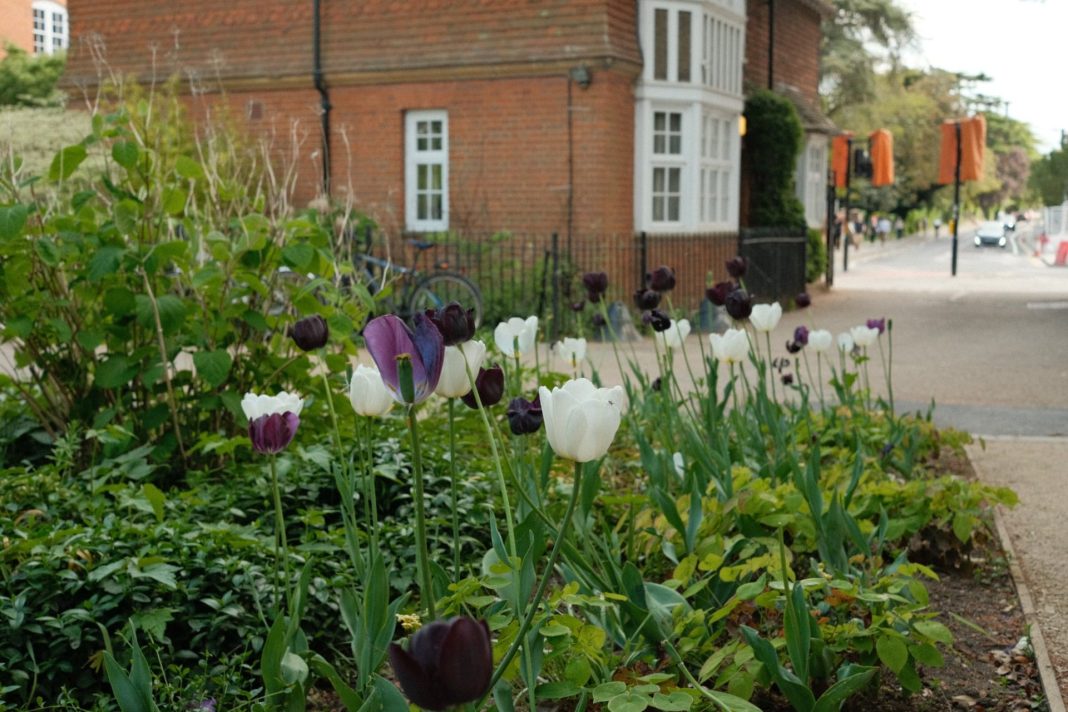Our recent spell of sunshine has offered a welcome opportunity to rediscover the natural beauty that the city of Oxford nurtures. Perhaps you’ve enjoyed a picnic by the river in Christ Church Meadows, played a game of frisbee in University Parks, or gazed at the horses in Port Meadow. You may have also caught sight of a squirrel springing between branches or heard birdsong cooing among the trees.
Architecturally, Oxford is a beautiful city as well. With the exception of hotly contested brutalist architecture, much of Oxford’s charm lies in how its architectural grandeur entwines with the natural environment – ivy climbs the walls of centuries-old buildings, while oriel windows are bordered by flowers in full bloom. After a typically bleak Hilary term – when most of us were tucked away indoors, hiding from the grey skies and constant drizzle – this reappearance of life feels restorative. When the sun does finally come out, everyone takes notice. It’s a quiet reminder that nature can subtly lift the weight of the term-time intensity. And haven’t we all felt better for the arrival of spring?
Scientifically speaking, at least, we certainly should have. It is popularly touted because it holds true: spending time outdoors in nature is good for you. Some theorists suggest that nature’s inherent mathematical order may provide us with a subconscious sense of harmony and coherence. It is, perhaps for many, the rare situation in which fractals, the Fibonacci sequence, or Euler’s number produces calm rather than anxiety. It’s a compelling idea to consider how such underlying structures might influence our perception and wellbeing.
In fact, time spent in nature may even have improved the quality of your work. Research suggests that exposure to natural environments can enhance cognitive function by restoring attention and supporting sustained concentration. Combined with the physical benefits already mentioned, this creates an ideal setting for clearer thinking and more focused study. Taking a quiet walk to your favourite green area might be more than just a break. It could be the reset your brain needs to re engage with the demands of academic life.
The philosophers agree that nature makes us feel better. Immanuel Kant delves into this in his Critique of Judgement, where he suggested that we find beauty in nature not because it serves a purpose, but because it doesn’t. It simply is. In our world of deadlines and goals, natural beauty offers us an experience free from self-interest. While nature has biological roles which serve us that is not why we walk through Magdalen’s deer park or linger by the Cherwell. We simply pause to appreciate.
Similarly, in the Metaphysics of Morals, Kant also looks at the theory that natural beauty makes us better people morally. Ultimately, the fact that we derive pleasure in something which is an end in itself may make us more open to being moral in general. The positive effect nature has on us can disseminate to other parts of life. On a societal level, we can conclude that it makes us more gentle in all parts of life. We become more moral, and the world becomes a better place.
Hopefully, we can carry this aesthetic disposition into other areas of our lives, into how we engage with friends, family, attend events, or pursue intellectual curiosities – not merely as a means to an end, but for the intrinsic joy they offer. Perhaps this helps explain the delight we feel when admiring Oxford’s ornate stone buildings and the discomfort sparked by its more brutalist corners – think St John’s Sir Thomas White Building, Somerville’s Margery Fry and Elizabeth Nuffield House, or Keble Road’s Denys Wilkinson Building.
Recent years have seen mounting threats facing our green spaces. Urban development and pollution increasingly loom over the green spaces we so enjoy. Despite our regular enjoyment of these environments, many of us remain unaware of their vulnerability. We picnic beside the Cherwell, have a croquet game in the college gardens, or read under the shade in University Parks – but too rarely do we consider how we might give back. The preservation of Oxford’s wildlife is not simply a matter of environmental stewardship, but a defence of something more intrinsic to the very nature of student life here. It is a matter of protecting those moments of outdoor tranquillity that punctuate the academic intensity of a library session. Perhaps it is the very aesthetic characteristic of nature which could ultimately help it save itself from us.
What is it, then, that Oxford’s flora and fauna gives us? Oxford’s natural spaces provide something humbly essential: physically, psychological, and philosophically. So, take time to visit your favourite green space. And when you’re there, consider the effect it has on you. Not just physically and psychologically, but morally.


